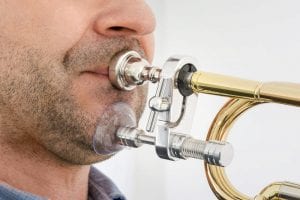Hey guy,good day let's talk about how to build strong Embouchure (strength) or (strong jaw) for a lasting and magnificent trumpet or brass performance.
1. What is embouchure?
2. Embouchure training with the instrument?
Unfortunately, this only works in moderation. You really can’t get any further on the instrument during your training. The reason: If you practice on the instrument and the embouchure is not really correct, you will compensate for any discrepancies by breathing differently (and often incorrectly) and straining your diaphragm and other muscles. The lack of strength and coordination of the lip and facial muscles would simply be covered up. So do the initial training without an instrument or with a methodical training tool (as we will see later), which regulates the pressure on the lips.
3. Training your embouchure on the go
Let’s admit it, a brass instrument can’t really be played anywhere. Be it during the day an the office, at university or perhaps on holiday. Muscles – as you know from other sports – have to be trained regularly and for days on end. One solution, Mouthpiece Practice Adapters such as the Warburten P.E.T.E. have proved their worth. They allow you to perfect your embouchure anywhere, any time and they work! If you have to take a break from your instrument for a few days, it makes your return much easier.
Photo Credit:https://www.thomann.
Another option is the Stratos Embouchure trainer set, which also gives you good results. The system was developed to ensure that a good embouchure comes about by itself. It forces you to play without excessive pressure that could damage the lips or strain the jaw and face muscles. This system is versatile and works for all brass instruments.
Photo Credit:https://www.thomann.
4. Lip exercises

Photo Credit:https://www.thomann.
Further training possibilities can be found with so-called lip calisthenics, or lip exercises. Sounds like bodybuilding, right? Well, it is, after all. Lips, facial muscles and the diaphragm muscle are the specific areas that have to be built up according to the same principle. There are many exercises you can do constantly, in the morning, throughout the day, at work, at school, (without making any noise). Check out this video for some ideas:
5. Mouthpieces
Of course you can also practice with only your mouthpiece, just like that, no instrument. The advantage of this variant is that you can adjust the lips to the specific dimensions of the mouthpiece at the same time. You also have a real feeling. Only by trying different mouthpieces will you know which one suits your physiology and your needs. The 3C mouthpiece from Arnolds & Sons, for example, is popular for the trumpet. Trombonists like to use the 6-1/2 AL-S mouthpiece from the same manufacturer.
6. Developing your range
Be careful when playing with others, especially when it comes to the pitch. If you constantly have to compensate for the incorrect pitch by, for example, pulling the mouthpiece closer to your lips, this simply makes your lips sore (pain), and won’t make them stronger. If you push the mouthpiece slightly away from your lips you will eventually develop your embouchure and be able to hit those high notes. Once you have mastered these high notes the facial muscles around your mouth should feel tired after a session, and this is a good sign. They need rest and the next day they will be stronger. It’s the same principle as getting punched in the arm (pain) and having a good workout in the gym (tired muscles which get stronger the next day). James Morrison explains it really well in this video:
7. Persistence, not overexertion
These different utensils for the preparation training are helpful. Please consider at least three aspects: First, success does not come overnight, of course. In addition, these are training devices that you have to use constantly. After all, during sports training in the gym, you don’t give up once your muscles have been inflated, they simply regress if untrained. Finally, an important tip: be careful and don’t overdo it. If your muscles tense up while playing, you’ve missed the target, try again and again until you are able to play in a relaxed way.









0 Comments